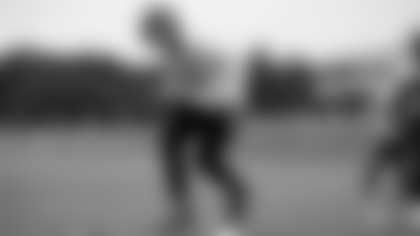Dwayne Haskins Jr. answered several questions on the death of George Floyd, the Black Lives Matter movement and talking with his teammates about social injustice during a videoconference with the local media Wednesday.
Here is how Haskins addressed these issues:
1. Haskins attended the Washington D.C. protests to "be a part of the difference."
The death of George Floyd has resulted in protests across the country and around the world, and the nation's capital was no exception. For days after Floyd's death, protesters filled Lafayette Square and the streets surrounding the White House.
Rather than sit at home and talk about social injustice, Haskins decided to take action and attend the protest himself.
"I wanted to go down there and be a part of the difference," he said. "It was my first protest ever, I never thought I'd ever be able to actually go to a protest especially in this day and age, so it was just crazy to be there."
Haskins talked to senior vice president of player development Doug Williams and senior director of player development Malcolm Blacken before deciding to go so he could interact with the protesters.
When he finally did make it to the protest, it became "a great experience" for him.
"[It was] just the energy and the atmosphere when you walk around people and how much you're supporting the cause. And just being a normal person felt great."
2. He applauds the way Ron Rivera has handled the situation.
Hours before Haskins addressed the media, head coach Ron Rivera opened his own press conference by stating that "a man sworn to protect us murdered George Floyd in the streets of Minneapolis. This act of pure violence and hate sparked massive protests across the country and people everywhere banded together in solidarity with the Black Community."
Rivera has spoken to team owner Dan Snyder, sports psychologists, members of the clergy and former police officers to get a full perspective on Floyd's death.
The organization has created town hall programs to help keep the community safe for people of color and the Black Engagement Network (BEN), which will "strengthen the Washington Redskins' commitment to Black employees through professional development, career management, mentoring, networking, an inclusive work environment and community outreach."
For all that, Rivera has earned Haskins' praise.
"I really applaud him for that and his confidence being able to stand with us," Haskins said. "He definitely wants to make a change as well. He wants to continue to work on being a united team and trying to be a difference in our community having played for the Washington Redskins and being in D.C."
Rivera also called team meetings in the days after Floyd's death to get the players' perspective and how to address it as an organization. It was clear that he valued their opinions, which is something Haskins appreciates.
"He definitely took that as something that was very important to address, and we're working on trying to be a difference in the community."
3. He feels that he can show himself as a leader.
Haskins wanted to do something that was more close to heart and genuine as opposed to tweeting or posting a video. That's why he attended one of the protests; he wanted to be a part of it and speak to the other people involved. Like Rivera, Haskins feels that actions speak louder than words, and he feels that the situation surrounding Floyd's death "most definitely" makes him feel like he can show more of himself as a leader by example.
"[I wanted to] be in that atmosphere to understand and hear the hearts that are crying out for help."
Haskins wants to be as informed as possible, so he has spoken with others about their own experiences with racism and police injustice. He's also had conversations with several of his non-African American teammates over the past two weeks, all of whom he said "appreciate the unity that we need to be able to do as far as overcoming this whole tragedy."
Haskins said he wants to be the face of the franchise, and it seems that he is backing up that claim.
4. He discussed his experiences being pulled over by the police.
As an NFL quarterback, Haskins said one would think that he wouldn't hear some of the questions he gets asked by police officers when he has gotten pulled over. But he has in the past, and it scares him.
"I mean, it's crazy," he said. "You get pulled over and they ask, 'Are you selling drugs, do you've got something in the car I need to worry about?'"
Haskins said there are "good and bad cops," so he knows his experience does not represent every police officer. He just relies on how he was taught to handle encounters with the police: do what they ask, don't go back and forth on what they have to say and just get in and out, because "you don't want anything to happen to you."
Haskins said "anything is evident every day with the body cameras and the killings of people," but no one knows when they're last breath will be, so "you always have to be prepared for everything."
5. He explained the importance of the Black Lives Matter movement.
The protests over Floyd's death have encompassed more than two weeks, and the information is still fresh on everyone's mind. Haskins fears that in another two weeks, people will move on to something else and quit talking about the issues that have been raised.
That's why he believes the Black Lives Matter movement is so important.
"I feel like a lot of things in life, we talk about it for a minute then we let it go a couple of minutes later," Haskins said. "Personally, for me, it has been Black Lives Matter my whole life, my whole parents lives and their parents lives."
Haskins feels the country need to formulate a plan of action that will bring unity to the country. He wants to feel like everyone cares. Now, he feels like everybody does, but "it shouldn't have to be somebody being killed in order to stop racism."
"That's just my perspective on that. One of the biggest things is just trying to stay united, especially with all of this chaos going on."














